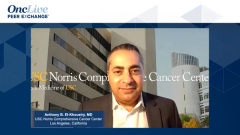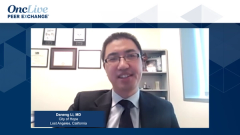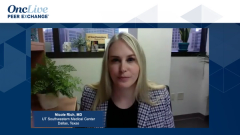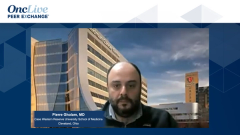
Sequencing Therapies After Frontline TKI Therapy in Advanced HCC
Experts in gastrointestinal cancers comment on their treatment approaches for patients with second-line advanced hepatocellular carcinoma who receive frontline TKI therapy.
Episodes in this series

Anthony B. El-Khoueiry, MD: Let’s shift gears a little. Let’s say the patient got a TKI [tyrosine kinase inhibitor] in the first line. They had an immunotherapy contraindication or a bevacizumab contraindication. What would be your go-to in the second line? We alluded to this a little. There are different scenarios, so I’ll help drive this conversation. The patient got sorafenib in the first line and tolerated it well. What’s your go-to in the second line, Dr Rich?
Nicole Rich, MD: It depends on the reason they got sorafenib in the first line. Is it because they were treated with sorafenib before atezolizumab-bevacizumab was available? If that was the case, there would be an argument to try atezolizumab and bevacizumab in that setting. That has been our practice. Post sorafenib, you’d consider regorafenib. Certainly, you could use cabozantinib or ramucirumab, as Dr Gholam mentioned, particularly for patients with AFP [⍺-fetoprotein] over 400 ng/mL.
Anthony B. El-Khoueiry, MD: Yes. Like Dr Gholam, I tend to respect the lines of therapy. We haven’t used atezolizumab-bevacizumab in the second line post sorafenib, especially because there are nivolumab-ipilimumab data. If I feel like the patient is an IO [immuno-oncology] candidate, I’ve gone to nivolumab-ipilimumab if I want to give them IO in the second line and they can tolerate it. Dr Li, when somebody starts with a TKI, whether it’s sorafenib or lenvatinib, do you have a preferred sequence? How do you think about it?
Daneng Li, MD: Yes. If it’s for patients who are contraindicated for immunotherapy, then it depends on what they start with, whether it’s sorafenib or lenvatinib, and how they tolerate it. If they tolerate sorafenib well, I’ve had no problem continuing that patient on regorafenib based on the RESOURCE data [NCT01774344] and staying true to the data. If they didn’t necessarily tolerate sorafenib very well, then I’d go to cabozantinib based on the CELESTIAL data [NCT01908426]. For patients who got lenvatinib in the first line, we don’t have data in that setting. I have typically chosen cabozantinib in that scenario to stay as true to the data as possible, given the fact that CELESTIAL allowed for up to 2 lines of therapy, of which 1 has to be sorafenib.
Anthony B. El-Khoueiry, MD: Very good.
Pierre Gholam, MD: I’d add that the more variables there are, the more likely I am to use cabozantinib. Because if you look at CELESTIAL, the inclusion and exclusion criteria are probably very liberal. One could factor in main PV [portal vein] thrombosis, tumor burden, preexisting agents, and subsequent therapies. That allows some degree of realistic confidence that the patient will likely have a response because of the way the trial was designed.
Anthony B. El-Khoueiry, MD: Very good.
Transcript Edited for Clarity









































